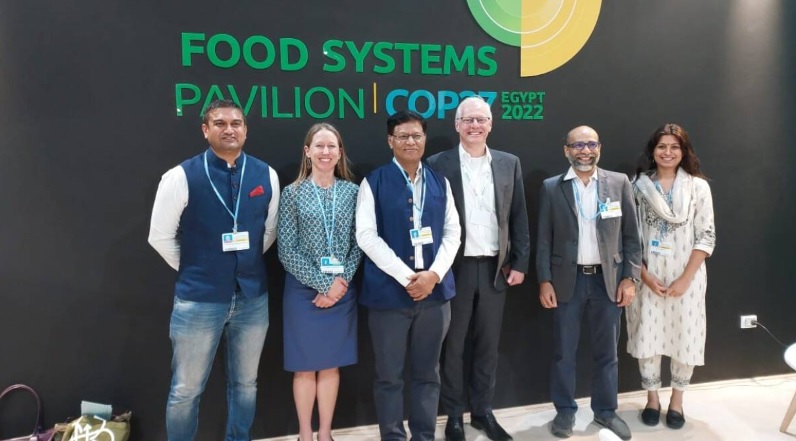BAIF at COP27
The entire World has come together to take up efforts for climate change adaptation and mitigation under UNFCCC. COP 27 (Conference of Parties) held in Egypt from November 6-18, 2022 with about 35,000 participants from 198 member countries, brought together countries to take forward coordinated climate actions.
BAIF led by Mr. Bharat Kakade, President and Managing Trustee and Senior Thematic Programme Executives – Mr. Sadashiv Nimbalkar, Mr. Yogesh Sawant and Mr. Raosaheb Kote, actively participating in the Blue Zone.
Mr. Kakade as a panelist, shared the concept and impacts of the Wadi programme in improving soils and degraded lands during the Session “Creating Win-Wins on soil? Rewarding Small Holder farmers for building Soil Organic Carbon” hosted by Ashoka Trust for Research in Ecology and the Environment (ATREE) as a part of Alliance For Reserving Ecosystem Threats (ARREST), at the Food Systems Pavilion. He highlighted how the work of BAIF was closely connected with food security and carbon emission reduction. The typical issues faced by small farmers in India are degraded lands, poor soil health resulting in low crop productivity thereby affecting the livelihoods of the poor. Several small holding farmers depend on seasonal migration for their livelihoods. He further mentioned that BAIF has evolved and upscaled the Wadi (agri-horti-forestry) based programme which has generated livelihood opportunities for 0.2 million smallholder farmers on their own lands through capacity building, skilling, training and support for planting trees. The fruit trees are planted in the farm and forestry trees on the borders. Short gestation crops are cultivated in the interspaces. The production is aggregated and marketed by the farmer cooperatives. The Wadis while providing sustainable livelihoods, also sequester significant quantity of Carbon to the extent of about 23 tons per ha. Therefore, the Wadi programme is a holistic programme.
Mr. Kakade was also a panelist in the session “Tree-Based System Transformation for Improving Lives and the Environment” hosted by Ministry of Environment, Forest and Climate Change at the India Pavilion under the theme “Lifestyle for Environment”. He shared the tremendous potential of India in planting trees outside forests. While appreciating the potential and working with families directly in rural India, he stated that BAIF has evolved various approaches while working with needy families. Despite the fact that India has advanced well in agriculture, green revolution and achieved food security, in certain rainfed and tribal dominant areas the typical issues of migration for livelihood exist due to degraded and low productive land resource. Although the Central Government and various State Governments have undertaken development through various programmes, these areas need further attention to enhance the livelihood opportunities along with resilience building and pro-carbon initiatives. Against this context, BAIF’s Wadi progrmme involves planting of fruit and forestry trees with soil health management. Appropriate intercrops and small plot cash crops are promoted for improving the livelihoods of the families. This initiative has transformed degraded lands into productive assets thereby improving the livelihoods and resilience of the families. The programme incorporates agro-biodiversity in the farming system. The Wadis are also helping in carbon sequestration through soil and wood stock. The famers are organized into farmer producer organizations to take up aggregation and marketing of the farm produce. Mr. Kakade also informed that BAIF has undertaken the Wadi programme to benefit 0.2 million families. The programme has been scaled-up by NABARD in 25 states of the country. There are various Government initiatives including the Central Government’s Farmer Producer Organization initiative which are instrumental in promoting the Wadi programme.
Mr. Kakade also informed that due to climate change impacts, the conventional area of apple cultivation has shifted in higher altitudes of the Himalayan regions. Hence, BAIF has introduced mini-apple variety in the area and this variety is performing well and is ready to be scaled up. He mentioned that here was a solution in the form of the Wadi approach and there is huge potential for promoting trees outside forests in India.
He also expressed the need for concerted efforts by non-profits, national and international organizations, funding institutions and carbon financing mechanisms to address the challenges faced by small holders as well as for creating carbon sinks.
BAIF expressed its decision to align its programmes with the following Strategic Low-Emissions Development Transitions outlined in India’s Long-term Low Emissions Development Strategies (LT-LEDS) Document released by the Union Minister for Environment, Forest & Climate Change and Labour and Employment, Shri. Bhupender Yadav at the Lifestyle for Environment, Ministry of Environment, Forest and Climate Change, India Pavilion and submitted to UNFCCC.
- Low Carbon Development of Electricity Systems Consistent with Enhanced Development Benefits
- Develop an Integrated, Efficient, Inclusive Low-Carbon Transport System
- Promoting Adaptation in Urban Design, Energy and Material-Efficiency in Buildings, and Sustainable Urbanisation
- Promote Economy-Wide Decoupling of Growth from Emissions and Development of an Efficient, Innovative Low-Emission Industrial System
- CO2 Removal and Related Engineering Solutions
The above transitions will be strengthened with Research and Innovation, Adaptation and Resilience, Mission LiFE – Lifestyle for Environment and International Cooperation.

